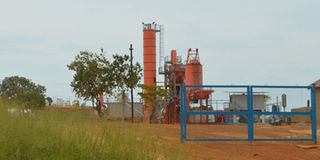Prime
Mixed feelings as construction of oil infrastructure progresses

The site where Hoima International Airport is being constructed.
The delayed relocation of dozens of graves in several villages in Buseruka Sub-county Hoima District, could affect the pace at which Hoima International Airport is being constructed.
The airport is being constructed mainly to transport cargo and personnel for the oil and gas sector. In future, according to government, the airport will be used for other commercial and passenger traffic to boost trade and tourism.
“The issue of graves is coming and it’s serious. The affected people were compensated in 2012 and agreed to move to other areas. What they got, maybe, was not enough to enable them relocate the remains of their beloved ones,” says Mr Amos Muriisa, the Spokesman of SBC Uganda, the company that is constructing the airport.
He, however, said the affected people have been identified and the Energy and Mineral Development Ministry and other stakeholders have held meetings to ensure that the affected people are compensated so that the phase of the construction is completed by 2021.

Mr Amos Muriisa, the spokesman of SBC Uganda, the company that was contracted to construct Hoima International Airport
Apart from the airport, the 29 km square mile chunk of land where people were moved is where the oil refinery will be constructed.
Given the expansive land, 7,018 people were compensated and relocated. The affected villages were Nyamasoga, Bukona, Kyapuloni and Kigaaga.
Although some of the people who were compensated are happy that their lives were transformed, others are cursing the day their villages were identified to host the airport and the refinery.
“He used to call me wife,” says Ms Harriet Twesige. “The day he got money for the 6.6 acres of land we owned as a family, he abandoned me and the four children.”
She suspects that the husband eloped with another woman.
Ms Twesige says she sells tomatoes and other vegetables to make ends meet in Kabale trading centre some three kilometres from the area where her home used to be.
“I am only lucky that I constructed this small house in the trading centre before the projects started. I used my personal money. I don’t know where I would be with my children,” she says.
Ms Twesige says since she was not legally married to the man, efforts to seek help from authorities like Local Council officials and police have come to naught.
She blames her predicament on the government’s failure to fail to consider the plight of women while drawing the compensation plan.
“Like dozens of other women, I am struggling to take care of the children and to educate them,” she said.

Ms Harriet Twesige says her husband abandoned the family after being compensated
Mr James Turyomwe, who was able to secure a modern house in a resettlement estate at Kyakabooga Modern Village is also regretting the day he was moved last year.
“I didn’t know that I was being brought a camp where I would share a compound with other people,” he says.
Mr Turomwe’s house is one of the 46 houses that, have so far been constructed on a 533 acre piece that was secured by the government to resettle people. More houses are expected be constructed for people who are interested.
He says the land which he was given to grow crops is far from his modern village house, which is an inconvenience.
“I used to plant maize, cabbages and other crops on my land which I no longer plant because the garden I was allocated is far from this estate,” Mr Turomwe, who is still waiting for the land title on the plot where his house is, says.

Mr James Turyomwe is not happy to live in a housing estate.
The modern housing estate project has mainly attracted the elderly and women.
Under the arrangement, some people who preferred money took it and moved on while those who preferred houses were resettled in the estate which is still being built.
Ms Fausta Tumuhairwe is happy to have been resettled.
“My old house [in Kabale] was grass thatched,” she says. “I now own a house which has a corrugated sheets roof,” she said.
Each 2-bedroom house has a 500-litre plastic tank.
However, all residents of the estate agree that the water reservoirs cannot sustain them and the boreholes that were promised to us by the Ministry of Energy, the implementation organ, are yet to be constructed.
“We were told that the estate would have piped water. The only social service available is a primary school but the health centre is not yet constructed,” Ms Tumuhairwe says. “We have to travel 5-kilometres away to seek medical care at Buseruka Health Centre.”

Ms Fausta Tumuhairwe, is happy to own a house in the modern housing estate
In Nsonga, Buhuka, Kyangwali, Kikuube District, residents whose land will be affected by the construction of the Central Processing Facility (CPF) by CNOOC, say, their relocation went on smoothly.
“The company constructed houses for the people who were displaced but we are still worried that the land title for the 2,000 acres of land where we live has not been issued to us,” Mr Issa Byaruhanga, the chairman of Bihuuka Community Land Association, said.
He said when CNOOC was given 500 acres for the construction of office premises, the pipeline and CPF, they were promised a land title for their communal land.
Mr Byaruhanga, however, said, despite the delays, the company constructed a health centre for the community that grapples with diseases like cholera.
Ms Flavia Nalubega, an official of Oil in Uganda project under Action Aid Uganda says, harmonious resettlement and compensation of people is necessary to avert future wrangles that could affect Uganda’s oil production efforts.




